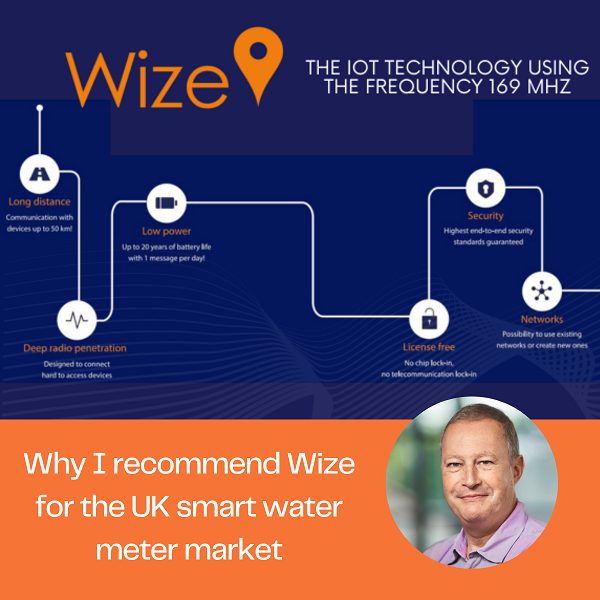By Eric Farnier (Technical Committee Executive Officer at WIZE Alliance)
When we consider smart water meters, it’s imperative that a reliable and accurate system is used to transmit the data back to a central data repository. This builds consumer confidence and aids in water preservation and leak detection.
An additional consideration is that as water meters are battery-operated and must work for about 20 years without manual intervention as it’s impractical to have to service them or replace batteries. Any wireless system specified needs to have minimal power requirements and deliver data integrity in challenging conditions – often underground, deep in buildings, or even in submerged flood conditions.
Of several competing systems, only the Wize protocol meets all these requirements, typically offering at least 99.5% regular coverage with an interference-free, fault-tolerant network, specifically designed for water metering in a cost-effective package.
Wize is an open European standard for smart meters using the 169 MHz VHF band, deployed as a LPWAN (low-power wide area network.) Unlike competing systems, it does not use cellular data but instead specially-developed wide area technology with each meter in contact with at least two local ‘concentrators’, allowing greater data integrity and a more reliable connection.
An additional advantage is the system is capable of remotely updating meter firmware, thus delivering greater value.
Because they are at a considerably lower frequency than other systems, 169 MHz signals have been proven to penetrate deeper underground and further into large buildings and still deliver reliable data. Network ‘clutter’ is also greatly reduced. Tests by SUEZ on underground installations have shown that compared with an 868 MHz (cellular) signal, a Wize signal at 169 MHz offers up to 14bB more gain – which is appreciable. This results in a far more fault-tolerant connection, which is especially critical in urban areas.
Each Wize system is specially deployed for the sole purpose of monitoring and controlling a set of water meters for a client company and is not dependant on any other system or contract. This means no interference from other wireless operators and no competition for network resources, as is the case with cellular-based systems. Also, the operational range of Wize-equipped meters is greater, normally leading to less infrastructure works and subsequent upheaval in the public domain.
Most mainstream water meter manufacturers incorporate Wize technology; these include models from Diehl, Itron, Honeywell-Elster and Sensus. Each is designed to operate continuously for 15 years and can be updated remotely using the Wize technology.
SUEZ has commissioned and successfully operated over 40 Wize systems throughout Europe, currently with an installed base of approximately 4,000 gateways in France.
To build Wize networks in the UK, SUEZ has partnered with several highly-regarded Tier 1 providers including Cornerstone for infrastructure and deployment, Wireless Infrastructure Group for the infrastructure, Vodafone for infill / backhaul and Magdalene for network build and operations.
In conclusion, only Wize can offer a truly reliable and cost-effective network solution for water meters. At SUEZ, we have the depth of knowledge and the practical experience to be able to specify, design and build a truly reliable and cost-effective water-metering system for almost any size UK network.
Eric Farnier has worked in Smart Metering since 2006 when he was involved in the first SUEZ smart meter project in Paris. Since then, he has been involved in the development of SUEZ smart metering solutions, helping define the bidirectional solution that became the Wize LPWAN.
As chair of the WIZE technical committee, he has actively participated in CEN/TC294 working groups on meter communication (wMbus) since 2009, creating the 169MHz mode N of the EN13757-4 standard that makes the Wize protocol a fully open and interoperable LPWAN solution for the IoT.
Eric is currently working on CEN/JTC13WG8: the European Radio Equipment Directive revision for cybersecurity that will define security solutions for smart metering in the future, in the context of the European Union’s Cyber Resilience Act.



